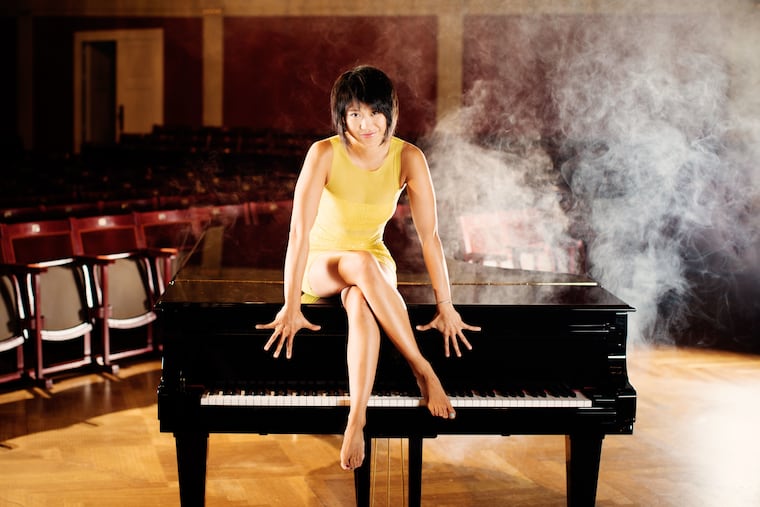Everyone has something to say about Yuja Wang. Here’s how the Philly-made superstar pianist thinks of herself.
On April 30, Wang returns for a Kimmel Center recital that includes a work about "something bigger than us."

Perhaps no one in classical music has drawn the same kind of fascination — and scrutiny — as Yuja Wang. The pianist, clearly one of Philadelphia’s starriest exports, just in the past few weeks has generated international headlines for a breakup with the Chicago Symphony Orchestra’s next music director, 28-year-old Klaus Mäkelä. A recent round of stories revealed that she wore a heart-rate monitor during last year’s marathon of Rachmaninoff piano concertos with the Philadelphia Orchestra at Carnegie Hall that measured, in essence, excitement.
Her concert attire is endlessly discussed by listeners, even beyond the usual borders of the arts. The New York Times’ Maureen Dowd last year pivoted her usual column from politics to the new sexiness in classical music, citing Wang’s “high-fashion miniskirts and stilettos for her bravura performances of Rachmaninoff” as evidence.
What no one has ever questioned, however, is that pretty much since her arrival at the Curtis Institute of Music in 2002 at age 15, Wang has been an almost peerless musical personality. As she’ll undoubtedly show in her April 30 homecoming solo recital in Verizon Hall, it’s rare that such preternatural virtuosity and deep interpretive insight concretize in a single artist.
How does the artist herself put her approach into words? That’s a little like asking the surgeon to do surgery on himself, she said in an interview with The Inquirer.
“It’s not about you, it’s not about the audience. It’s about the music itself,” she says. “And in a way, I think it’s about bringing out the essence of music — the language, the syntax of what the composer is trying to say.”
An intrinsic understanding of the score comes first, she says, and from that core, a sense of spontaneity can grow.
“I kind of take whatever the day has given me — you know, the vibe, what the energy field is giving me, and kind of just create on the spot.”
Wang’s musical influences are numerous and largely rooted in the past. Curtis is known for a pedagogy grafted from Russian and European conservatories of more than a century ago. But , Wang, 37, connected with these traditions well before Curtis, while she was still a young piano student in China, via recordings.
“They were actually CDs — I feel old now,” she says. “My teacher in China had great taste, so I heard lots of [Wilhelm] Kempff, [Arturo Benedetti] Michelangeli, and Leon Fleisher. Also, I went to Canada before Curtis, so there was lots of Glenn Gould.”
In person, her influences stemmed from traditions embodied by Fleisher and longtime former Curtis director and professor Gary Graffman, as well as the pianists who taught them.
“I was inspired a lot by Leon Fleisher, because we did a Carnegie Hall workshop on late Schubert and also some Mozart concertos, and actually I met him in Aspen, where he was teaching master classes. And so there was that tradition of [pianist Artur] Schnabel. And from Gary’s side, always number one for me is [Vladimir] Horowitz. And then of course, listening to Rachmaninoff.”
Another thing she traces to her Curtis days is a love of chamber music — a genre where she “feeds off lots of sparks from other musicians and, surprisingly, the other way around. Like sometimes I feel great they’re catching that as well. So that’s really amazing.”
But she has just come off a string of solo recitals in China, and being the sole musical voice on stage “has a joy of its own. It’s like you’re really leading the journey yourself.”
The journey for her Philadelphia recital includes Chopin, Debussy, Scriabin, and movements from Vingt Regards sur l’Enfant-Jésus by Olivier Messiaen, the late French organist and composer whose music can be infused with birdsong, Asian harmonies, and an often mysterious spirituality.
Wang once met pianist Yvonne Loriod, Messiaen’s second wife and musical partner.
“I played for her when I was 12 and I was hoping to get some insight on performance or playing the piano. But all she talked about was theoretical, and it was really dry.”
Messiaen’s music, though, is anything but dry. The Twenty Contemplations on the Infant Jesus, that premiered in Paris in the last stretch of World War II, is a set of 20 movements on angels, the virgin, the magi, and other sacred matters.
They are also about colors, silence, and love.
The piece establishes “a world that’s very, very religious, very centered, and just self knowing,” says Wang — “an inner exploration and also this energy transmitting from the cosmos. It is all that stuff. Right now we’re all talking a lot about mental health, about centering oneself, grounding oneself. And I thought about this before we had all these buzzwords, but the music just has a joy in it and looking up to something bigger than us. And by having faith in that, you are kind of OK with yourself.”
Yuja Wang performs in Verizon Hall, Broad and Spruce Sts., April 30 at 8 p.m. Tickets are $99-$299. philorch.org, 215-893-1999.